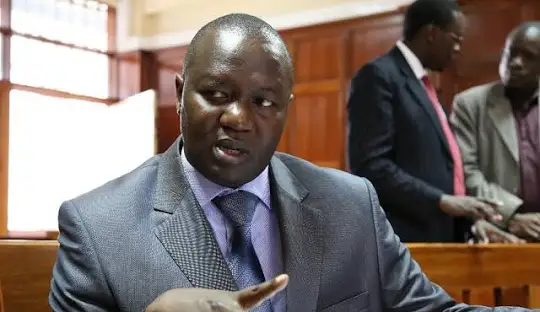Kenyan Senator Tom Ojienda has raised concerns over the growing cases of abductions in Kenya, particularly the recent high-profile case of political big wig Dr. Kizza Besigye.
During an interview on Citizen TV, Kenya, Ojienda expressed his worry about the lack of resolution in abduction cases, stating that the Kenyan security apparatus has failed to provide answers.
“Only last week we summoned various players within the the security sector before Senate and essentially and now you have figures from the Kenyan National Commission on Human Rights on the number of abductions that have occurred.” he said
Ojienda referred to Besigye’s arrest in Nairobi, where he allegedly entered Kenya as a private citizen, only to be abducted from an apartment. Ojienda noted that the Kenyan government had no information about Besigye’s entry into the country, raising questions about the security of the nation’s borders.
He pointed out that the Ugandan authorities, rather than Kenyan officials, were responsible for Besigye’s abduction, with individuals from Uganda reportedly taking him from Kenya.
The senator noted the complexity of the situation, noting that Besigye was ‘illegal abuducted’ to face legal charges in Uganda.
“Besigye came to Kenya undercover. He did not come (1:22) he came into Kenya as a private citizen. So he may be, he was taken out of Kenya illegally, but he’s facing a legal process in Uganda which I think stemmed from whatever he did before he came into Kenya. It’s hazy and then there’s also clear information that he was apparently abducted, not by Kenyans, but by Ugandans, by individuals who came into Kenya armed and took him out of Kenya.” he said

Ojienda also warned that such incidents could have broader implications for the East African region, as they involve issues of cross-border legal jurisdiction and the treatment of individuals who flee to neighboring countries for refuge.
“I think it goes, it also goes to the entire framework of the East African Community, 1999, and the peace and security aspects, and of course regional, or what you say, international crime within East Africa. How do we treat individuals who commit crimes within the region? Can you, for instance, commit crime in Kenya, move to Uganda, or to southern Sudan for protection? And how should countries then treat you? So this is a delicate issue within the framework of the treaty.” he questioned
Ojienda also acknowledged the proactive efforts of Kenya’s Inspector General of Police, Hillary Mutyambai, in addressing abductions, but stressed the need for stronger action to prevent and manage such cases in the future.
He called on the government to take a more transparent approach, investigate the incidents, and hold accountable those responsible for the abductions.
“We need to know what arms undertake these abductions, and we need to stop these abductions, so that whoever is responsible, I think, should be brought to work.” he stated
The senator’s remarks come at a time when the Kenyan National Commission on Human Rights is compiling data on the frequency of abductions.













